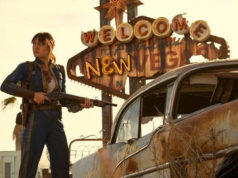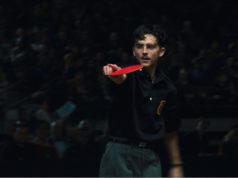Nothing in Hitchcock tops its opening sequence. After serial killer Ed Gein (Michael Wincott) murders his brother with a shovel, the camera pans to Alfred Hitchcock (Anthony Hopkins) standing a few feet away, wearing a suit and drinking tea from a cup and saucer. “Oh, dear!” says the Master of Suspense as he turns to the camera. “I didn’t see that coming!” He laments that Wisconsin police didn’t stop Gein sooner, then reflects, “But then, if they had, we wouldn’t have our little movie.” This delightful beginning sets us up to expect some of the same lurid, macabre wit that makes Hitchcock’s masterpieces so much perverse fun. Instead, we get a trite nostalgia piece that never seems to come ’round to a point.
The story takes place in 1959, just after the premiere of North by Northwest. While Hollywood expects “Hitch” to follow up that plush, crowd-pleasing spy thriller with a similar movie, the director instead wants to make something rawer on a lower budget. His choice is an adaptation of Robert Bloch’s Psycho, a novel based on Gein’s real-life murders. With studios shying away from the tawdry subject matter, Hitchcock mortgages his house to finance the project.
Hitchcock is adapted from Stephen Rebello’s book Alfred Hitchcock and the Making of Psycho, taken from interviews conducted with Hitchcock shortly before the director’s death in 1980. Much of the story centers on the relationship between Hitch and his wife Alma Reville (Helen Mirren), who does much uncredited labor on his scripts and the editing of his films. The movie seems to think this qualifies as a thunderbolt of revelation, but it’s so muted that it barely registers. We want more on her contributions to the artistic process, and we also want more on Hitchcock’s plentiful sexual hang-ups, which fairly ooze out of his films. (They also led him to make a crude pass at actress Tippi Hedren later on, an episode not referred to in this movie.)
Instead, Hitch and Alma are just a boring, discontented married couple in this movie, with him gazing lustfully at his beautiful blonde leading ladies and her pondering an affair with a handsome hack screenwriter (Danny Huston). When Alma asks her husband why he’s staking so much on Psycho, he says the project reminds him of the low-budget movies he made with her in England during their younger days. The story of a guy who tries to rekindle his marriage by making a violent slasher movie with his wife could have made for some bizarre entertainment. Hitchcock doesn’t go there.
In fact, director Sacha Gervasi (who previously made a pretty good rock music documentary, Anvil: The Story of Anvil) takes this story ’round in circles. Hitch occasionally talks to an imaginary Gein, but their conversations yield nothing of note. The same goes for Hitch’s relations with supporting actress Vera Miles (Jessica Biel). The scenes about the business dealings around Psycho will interest only those fans who have watched Hitchcock’s film at least 10 times. Composer Bernard Herrmann (Paul Schackman) turns up at one point complaining that he doesn’t know how to score the film’s shower scene. After some advice, he has the shrieking violins on the soundtrack 20 seconds later, and that’s it for some of the most famous movie music ever written. Our one hint of the darker streaks in Hitch’s personality comes when he’s dissatisfied with the performance of Janet Leigh (a well-cast Scarlett Johansson) in the shower scene, which leads him to take the prop knife in his own hands and terrorize her for real to get her to scream in the proper way. This gives the movie a momentary shot of adrenaline; the trouble is, it’s not followed up on.
One scene in particular typifies the way Hitchcock blows its chance. It’s when Hitch shows Leigh and Anthony Perkins (James D’Arcy) the set of Norman Bates’ room, and Perkins asks why Norman spies on Marion in the shower. More than any other filmmaker in history, Hitchcock knew the powers, the pleasures, and the price of voyeurism. We know this, so we wait for his fictional avatar to give us some dazzling insight into his own character and why we’re so enthralled by the spectacle of sex and violence on the big screen. What do we get instead? Some blandly professional advice from a director to a gay actor who is so clueless that he needs to ask the question in the first place. How dull.
[box_info]
Hitchcock
Starring Anthony Hopkins and Helen Mirren. Directed by Sacha Gervasi. Written by John J. McLaughlin, based on Stephen Rebello’s book. Rated PG-13.
[/box_info]













Save Hitchcock from BBC’s THE GIRL http://savehitchcock.com